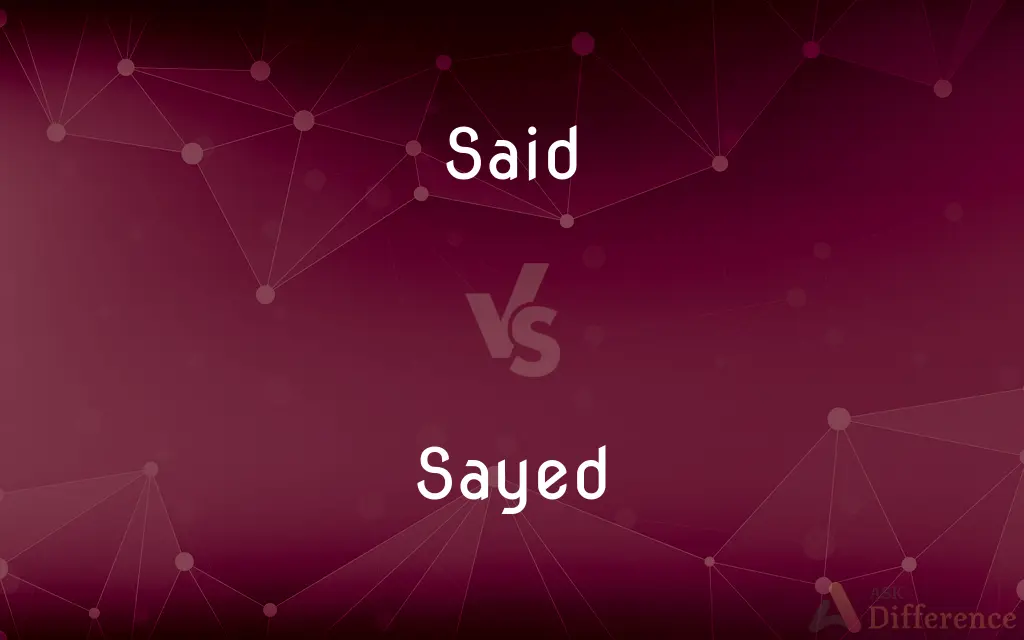Said vs. Sayed — What's the Difference?
By Tayyaba Rehman & Urooj Arif — Updated on March 28, 2024
"Said" is the past tense of "say," indicating something was spoken or stated in the past, while "Sayed" is a title used in Islamic cultures, often denoting descent from Muhammad.

Difference Between Said and Sayed
Table of Contents
ADVERTISEMENT
Key Differences
"Said" functions as the past tense and past participle of the verb "say," used in English to report speech, thoughts, or sounds that were expressed previously. It is one of the most common verbs in English, essential for narrating events or conversations that took place in the past. On the other hand, "Sayed" (also spelled "Sayed" or "Seyyed") is not a verb but a title of respect or honorific used in Islamic cultures, particularly among Shia Muslims, to indicate someone believed to be a direct descendant of the Prophet Muhammad through his daughter Fatima Zahra and son-in-law Ali ibn Abi Talib.
While "said" is a term used universally in English-speaking contexts without religious or cultural specificity, "Sayed" carries significant religious and cultural connotations, primarily in Muslim communities. "Said" can be applied in any context where past speech or sound needs to be indicated, making it versatile and widely applicable. Conversely, "Sayed" is used in more specific contexts, often preceding a person's first name to denote their esteemed lineage and sometimes implying certain social or religious responsibilities.
The application of "said" is grammatical, serving a function within the structure of a sentence to convey time and action related to speech. "Sayed," however, is applied as a part of a person's name or title, reflecting heritage and respect within a community. This difference underscores the distinct nature of the two terms: one is a functional element of language, and the other is a component of identity and social structure.
Understanding the distinction between "said" and "Sayed" requires recognizing "said" as a part of everyday language, essential for past tense narration, and "Sayed" as a cultural and religious identifier. Misusing or confusing these terms could lead to grammatical errors in the case of "said" or cultural insensitivity or misunderstanding concerning "Sayed."
The historical and linguistic origins of "said" trace back to Old English, highlighting its long-standing role in English language development. "Sayed," however, has its roots in Arabic, reflecting the spread of Islam and its cultural practices across various regions, enriching the linguistic tapestry of communities where it is used. This etymological background emphasizes the evolution of language in response to social, religious, and cultural influences.
ADVERTISEMENT
Comparison Chart
Definition
Past tense and past participle of "say."
A title denoting descent from Muhammad.
Usage
Universal in English for reporting past speech.
Specific to Islamic cultures for honoring lineage.
Context
Used in everyday language and writing.
Used as a title or part of a name in specific communities.
Connotation
Neutral, related to the act of speaking.
Respectful, indicating esteemed heritage.
Linguistic Role
Grammatical element (verb).
Part of personal names or titles (noun).
Compare with Definitions
Said
Past tense of "say," used to report speech or thoughts.
He said he would be late.
Sayed
Often used as part of a name or introduction.
Sayed Hassan participated in the conference.
Said
Utilized in writing to attribute dialogue or information.
I love this song, she said.
Sayed
Indicates nobility or esteemed lineage in Islamic cultures.
Being a Sayed carries both respect and responsibility.
Said
Used in legal and formal documents to refer to previously mentioned subjects.
The said witness failed to appear.
Sayed
A title for males believed to be descendants of the Prophet Muhammad.
Sayed Ali is highly respected in his community.
Said
Indicates something mentioned previously.
The said proposal was approved.
Sayed
Reflects a direct lineage to Islamic prophets or saints.
His family is known for being Sayed, tracing back to the Prophet.
Said
Refers to expressing something in words.
Whatever is said in the meeting stays confidential.
Sayed
Used in religious and cultural contexts to denote honor.
As a Sayed, he led the prayer at the mosque.
Said
Past tense and past participle of say.
Sayed
Misspelling of said
Said
Named or mentioned before; aforementioned
The party to the contract subsequently breached said contract.
Said
Simple past tense and past participle of say
Said
Mentioned earlier; aforesaid.
The said party has denied the charges.
Said
Mentioned earlier; aforesaid.
Said party has denied the charges.
Said
Before-mentioned; already spoken of or specified; aforesaid; - used chiefly in legal style.
Said
Being the one previously mentioned or spoken of;
Works of all the aforementioned authors
Said party has denied the charges
Common Curiosities
What is the significance of being called "Sayed"?
Being called "Sayed" signifies descent from the Prophet Muhammad, carrying respect and sometimes implying religious or social responsibilities.
Who is referred to as "Sayed"?
"Sayed" is a title used for individuals believed to be direct descendants of the Prophet Muhammad in Islamic cultures.
How is "said" used in a sentence?
"Said" is used to report past speech or thoughts, e.g., "She said she would come."
Can anyone be called "Sayed"?
"Sayed" is specifically used for individuals with verifiable descent from the Prophet Muhammad.
Is the use of "said" limited to past tense narration?
Primarily, yes, "said" functions as the past tense and past participle in narrating past speech or events.
What does "said" mean?
"Said" is the past tense of "say," used to indicate spoken or stated words in the past.
Can "said" and "Sayed" be used interchangeably?
No, "said" and "Sayed" serve entirely different purposes and cannot be used interchangeably.
How is "Sayed" used in social contexts?
In social contexts, "Sayed" is used as a respectful title before a person's name, acknowledging their noble lineage.
Is "Sayed" a common name?
"Sayed" is more than a name; it's a title denoting noble lineage in Islamic cultures, though it can be part of personal names.
What is the difference in pronunciation between "said" and "Sayed"?
"Said" is typically pronounced as /sɛd/, while "Sayed" may vary but is often pronounced as /ˈsaɪ.ɛd/ or /ˈsæ.jɛd/, reflecting its Arabic roots.
What is the origin of "said"?
"Said" comes from Old English, reflecting its longstanding use in the English language.
Where does the title "Sayed" come from?
The title "Sayed" has Arabic origins, associated with lineage to the Prophet Muhammad.
What does it mean to be a "Sayed" in a community?
Being a "Sayed" in a community often means being regarded with respect and sometimes looked to for leadership in religious or social matters.
Can "Sayed" be a part of a longer name?
Yes, "Sayed" is often used as a prefix in longer names, denoting the person's esteemed lineage.
How does the use of "said" affect legal or formal documents?
In legal or formal contexts, "said" is used to refer precisely to previously mentioned subjects or entities.
Share Your Discovery

Previous Comparison
Industrialised vs. Industrialized
Next Comparison
Deal vs. DeedAuthor Spotlight
Written by
Tayyaba RehmanTayyaba Rehman is a distinguished writer, currently serving as a primary contributor to askdifference.com. As a researcher in semantics and etymology, Tayyaba's passion for the complexity of languages and their distinctions has found a perfect home on the platform. Tayyaba delves into the intricacies of language, distinguishing between commonly confused words and phrases, thereby providing clarity for readers worldwide.
Co-written by
Urooj ArifUrooj is a skilled content writer at Ask Difference, known for her exceptional ability to simplify complex topics into engaging and informative content. With a passion for research and a flair for clear, concise writing, she consistently delivers articles that resonate with our diverse audience.















































